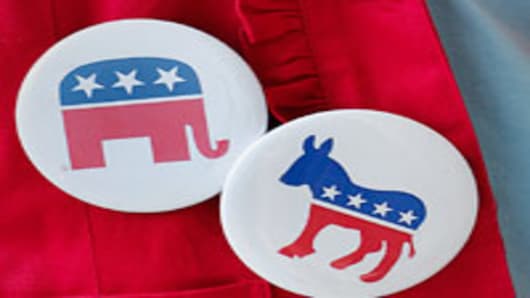“Why do great nations fail?” a Chinese professor asks an auditorium of attentive students in Beijing in 2030.
“The ancient Greeks, the Roman Empire, the British Empire and the United States of America. They all made the same mistakes. They turned back on the principles that made them great.”
The slickly produced advertisement, which was put up last weekend by Citizens Against Government Waste, an independent group, has been described by some pundits as the midterm “advert of the season”.
Six months ago many had been expecting that China – or fear of China – would play a larger role in the US midterm elections.
But until last week resentment of China’s economic prowess was the dog that had largely failed to bark.
Furthermore, the CAGW advert, which targets President Barack Obama’s allegedly excessive spending, sidesteps the widespread view across the US that jobs continue to be exported to east Asia – one that also features in ever stronger anti-trade sentiments.
A recent NBC/WSJ poll showed that 53 per cent of Americans think free trade has been bad for the country.
But Democrats have largely avoided making trade into a campaign issue.
Instead, they have focused on the role of anonymous corporate spendingin the midterm elections following a Supreme Court ruling earlier this year that opened the floodgates for companies to spend freely on their issues during elections.
Mr Obama briefly attempted to generate outrage over the US Chamber of Commerce’s overseas membership dues – insinuating that foreign companies were bankrolling the Republican party’s campaign.
And in what may be the secondmost noteworthy advert of the campaign, the Democratic National Committee earlier this month put out a spot that highlighted shadowy Chinese donors as the culprit.
The advert, entitled “stealing our democracy”, alleged the Republicans were benefiting from foreign money.
Against the grainy backdrop of a woman having her bag snatched in an underground car park, the advert shows someone counting out 100-renminbi notes bearing Mao Zedong’s face.
But the issue failed to catch on.
And David Axelrod, Mr Obama’s senior political adviser, was caught fumbling on national television when he was asked to explain whether the Obama administration had any evidence the US Chamber of Commerce had channelled foreign money into the campaign.
“Is this the best you can do?” asked Bob Schieffer, the CBS host, when Mr Axelrod said the chamber should prove it had not used overseas funds.
Instead of acting as a lightning rod for popular angst over continued US joblessness, China’s role in the midterm campaign has been bound up with more generalized fears about declining US power.
According to a Financial Times analysis of the 68 “toss-up” districts identified by the Cook Political Report, unemployment has risen faster and the median household income has fallen further in those districts than in the average across the US.
But few of the Republican challengers to Democratic incumbents in those districts have made the loss of manufacturing jobs, or outsourcing to China, a strong plank in their election campaigns.
Paradoxically, given China’s success in pushing through an effective – and relatively larger – fiscal stimulus last year, Republicans have largely confined themselves to attacks on Mr Obama’s spending record.
That is also the target of the CAGW advert.
With a menacing half-smile, the Chinese professor concludes: “America tried to spend and tax itself out of a great recession with enormous so-called stimulus spending, reforms to healthcare, government takeover of private industries, and crushing debt.
Of course, we owned most of the debt,” he says, pausing for a chuckle. “And now they work for us.”
The audience erupts into laughter.


